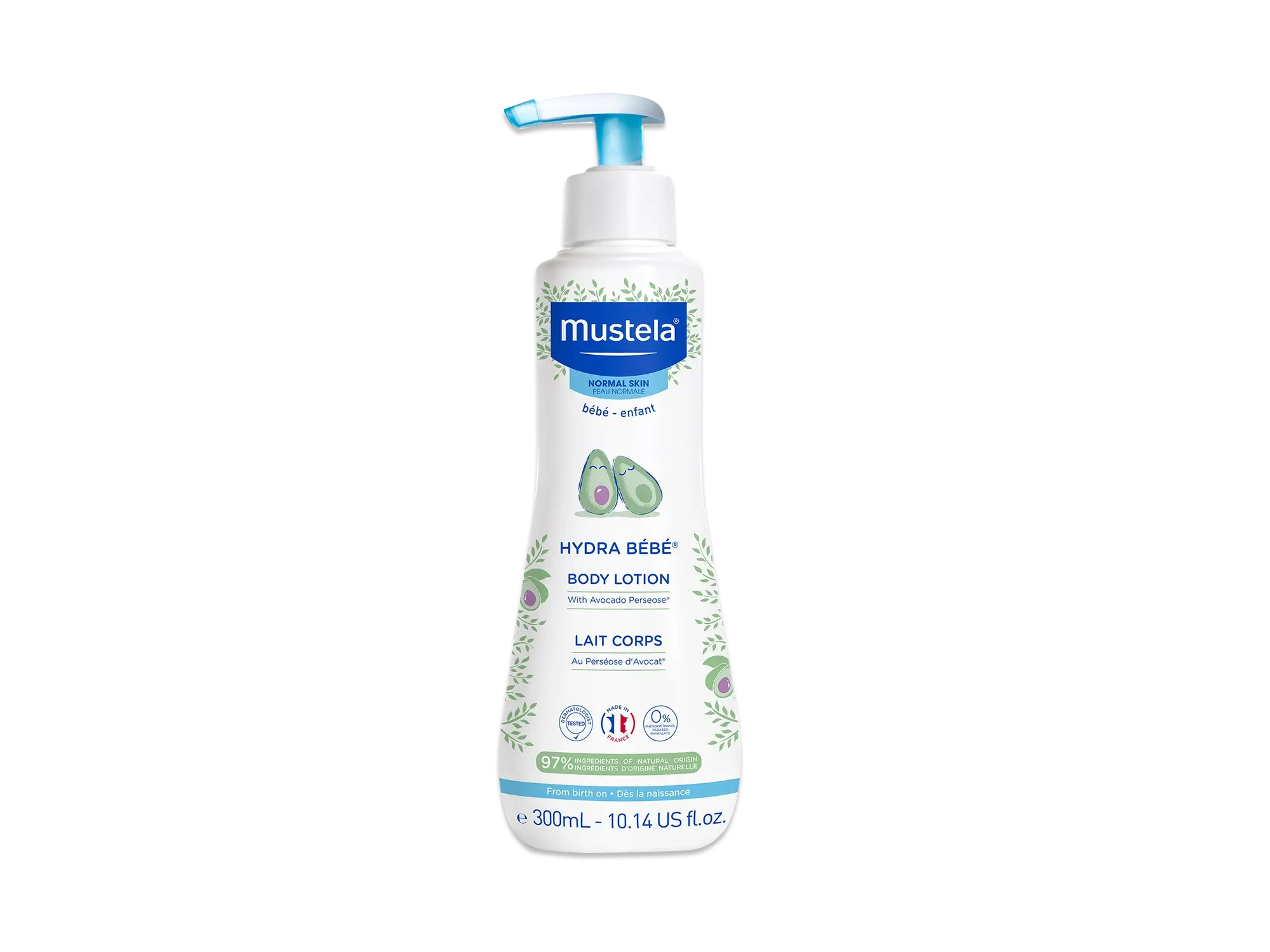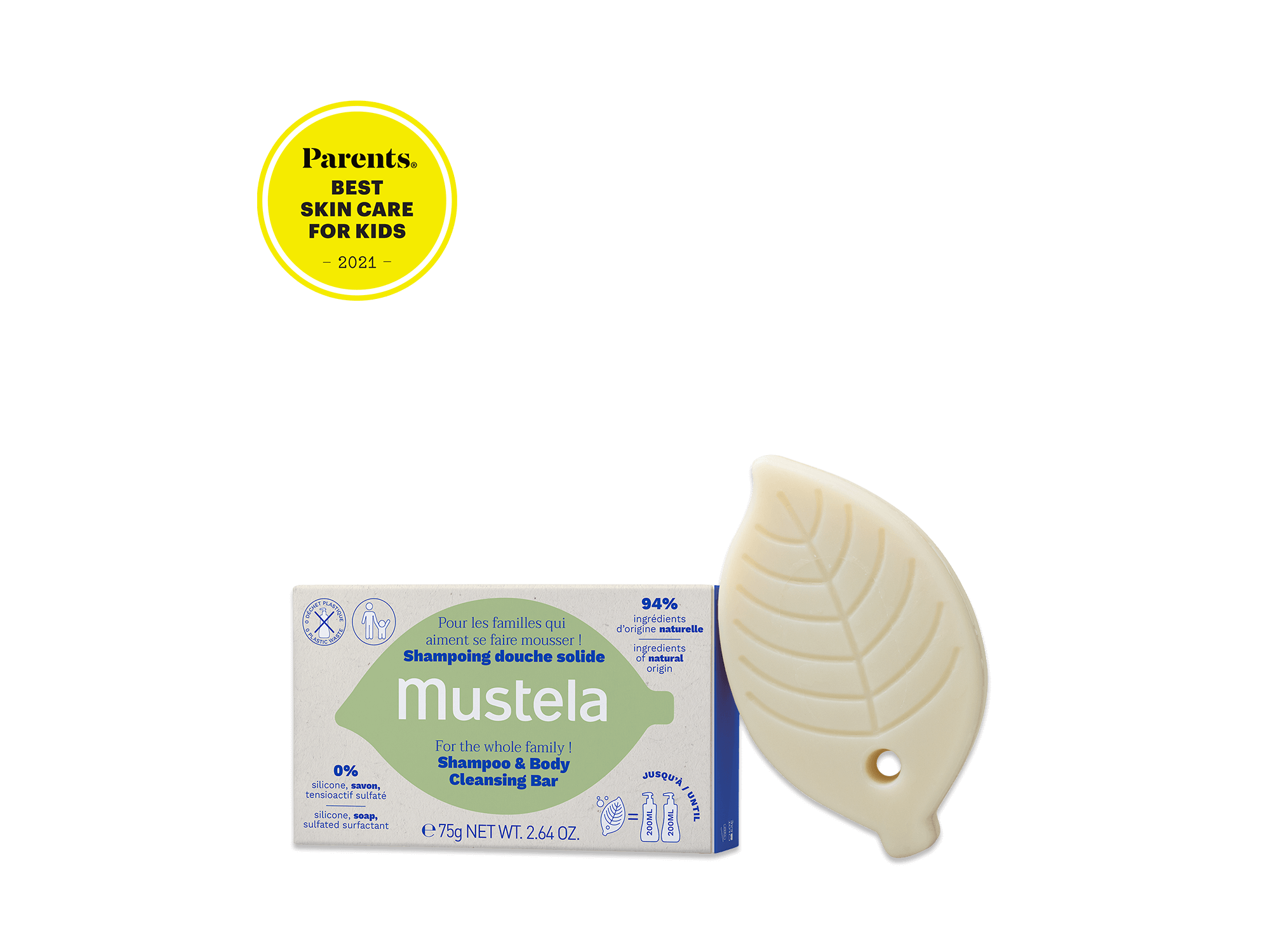If your baby resists falling asleep at night, wakes up more than usual once they do, and has a hard time napping during the day, they may be in the midst of the 3-month sleep regression.
This can be a difficult time for you and your little one, but we’re here to help.
In this article, we’ll explain what’s going on, what may be causing the sleepless nights, what signs to look out for, and how to deal with the 3-month sleep regression when it arrives.
What Is A Sleep Regression?

A sleep regression is a sudden and prolonged change in your baby’s sleep habits.
During a sleep regression, your little one may switch from their normal pattern of sleeping well to consistently having trouble falling asleep or staying that way.
This switch typically occurs around developmental milestones — three months, six months, eight months, 12 months, 18 months, and 24 months — when their body and mind are growing by leaps and bounds.
Keep in mind that a single night or two of bad sleep isn’t necessarily a full-blown sleep regression. Your little one could just be sick or excited from the trip to see grandma.
That said, if the poor sleep continues and your baby doesn’t fall back into their regular schedule, those first one or two nights may have been the beginning of the 3-month sleep regression
Do All Babies Have A 3-Month Sleep Regression?
Sleep regressions can be unpredictable. Not all babies will experience every single sleep regression, and a few may not have any. It’s also possible for a baby to go through several sleep regressions during their first two years of life.
Every baby is different, so it’s hard to say exactly when one will happen, how long it’ll last, and how severe it’ll be. But no matter when one strikes, remember that sleep regressions are a normal part of your baby’s developmental process.
And tell yourself that your little one will eventually learn how to sleep the whole night through!
Causes Of The 3-Month Sleep Regression

It’s difficult to pinpoint one exact cause for the 3-month sleep regression. However, a few common factors may contribute to this challenging phase.
1) Rolling Over At Night
As your little one gains strength and motor control, they’ll eventually be able to roll from their back to their tummy and vice versa. This usually happens around the three- or four-month mark.
When that milestone finally arrives, your baby may roll during their sleep and suddenly find themselves in an unfamiliar or uncomfortable position that they can’t get out of.
Such unconscious movements can cause them to wake up and fuss more often in an attempt to get back to a comfortable position.
2) Growth Spurt
A growth spurt is a short period of time when your baby experiences rapid physical changes (such as increases in height and weight). Growth spurts often come with discomfort that your little one likely won’t know how to handle.
As a result, your 3-month-old might be fussier than normal, take shorter naps, and wake up more often during the night — or even refuse to go down at all.
They may also be hungrier since they need more calories to support their development. As a result, they may wake up searching for more milk to fill their belly.
3) Teething Pain
Along with rolling over in their sleep and the discomfort caused by a growth spurt, teething can be another major cause of the 3-month sleep regression.
Though your little one may not get their first tooth until their six-month birthday, their body starts developing those teeth around the three-month mark.
That physical change can cause your baby to wake up more often, sleep less, and be fussier than usual.
4) New Awareness Of Temperature And Light
As your little one grows, they become more aware of temperature and light. This newfound awareness can cause your baby to wake up more often — because they get too warm or too cold or there’s too much light in their room.
It can also cause them to be more sensitive to their environment, leaving them unable to go to sleep in the first place.
5) Cognitive Development

Around the three-month mark, babies begin a period of rapid cognitive development. During this time, they:
- Become more aware of their surroundings
- Start recognizing faces and objects
- Develop new skills, such as grasping an object and pulling it closer to examine it
This heightened cognitive activity can disrupt their sleep patterns as they try to make sense of all the new information. They may also be more alert during the day and then overtired at night, making it harder to settle down and sleep.
6) Changes To Their Circadian Rhythm
When your baby was born, they didn’t have a circadian rhythm. This natural body clock, which regulates the sleep-wake cycle, doesn’t fully develop until the first birthday.
However, it starts to take shape around the three-month mark, and as your baby becomes more attuned to it, their sleep patterns can be affected. During this time, they’ll start to sleep in cycles that are more similar to an adult.
This may mean they have more distinct deep, light, and REM (rapid eye movement) sleep periods. Unfortunately, after each cycle, they may wake up and not yet have the skills they need to put themselves back to sleep.
7) Schedule Changes
Babies like routines. They thrive on them. Unfortunately, life isn’t always predictable, and things like travel, illness, or a doctor's visit can disrupt your baby’s sleep patterns.
For example, if they miss their morning nap for a few days in a row, it can throw off their entire schedule. Help them get back onto their routine as soon as possible by sticking to a regular bedtime and trying to keep naps consistent.
If your baby is particularly sensitive to changes in their schedule, it may take a few days for them to readjust, so try to be patient and understanding.
Signs Your Baby May Be In A Sleep Regression

1) Resistance To Naps
As we touched on in the previous section, one of the major signs of the 3-month sleep regression — or any sleep regression, for that matter — is a sudden resistance to naps.
One day your little one may nap for a few hours mid-morning and mid-afternoon, and the next day they may only nap for 20 minutes before being fully awake again — if they’re able to go to sleep at all.
This dramatic switch may mean they’ve entered into a sleep regression.
2) Increased Fussiness
The physical and mental milestones your baby goes through at three or four months of age means they may be fussier than normal.
All of these developmental milestones we mentioned earlier often lead to discomfort that your baby doesn’t know how to handle other than through a good cry.
If your little one seems fussier than usual, it may be a sign that a sleep regression is imminent.
3) Trouble Falling Asleep At Night

One of the first changes in behavior you may notice is that your little one suddenly has trouble falling asleep at night.
Come their normal bedtime, they may exhibit all the classic traits of being tired but fight falling asleep with all their might.
If your baby’s schedule has been pretty consistent — go down around 8 p.m., wake at 11 p.m., and then sleep for the rest of the night, for example — and then, suddenly, they’re up well past 9 p.m., that could indicate they’re on the verge of the 3-month sleep regression.
4) More Frequent Night Waking
Your baby’s going to wake up at night. That’s just a fact of life. But, when they do so every hour or two, there may be something going on — like a sleep regression.
Like the other signs on this list, if there’s a sudden, marked change from your little one’s normal sleep schedule, it could be an indication that they’re starting, or already in, a sleep regression.
5) Changes In Appetite
Sleeping and eating habits often go hand in hand. If you notice a sudden increase or decrease in your baby’s appetite, especially at night, it could be a sign of a sleep regression.
They may want to suck to soothe themselves when they’re struggling to fall asleep or stay asleep. If you’re nursing, you may suddenly find yourself being used as a human pacifier. If you're bottle-feeding, your baby may want more formula or breastmilk than usual.
How To Deal With The 3-Month Sleep Regression

Now that you know more about the dreaded 3-month sleep regression, the burning question is: how do you deal with it? Here are some tips to help you and your baby get through this challenging stage.
1) Stick To Your Routine
Though it may seem futile at first, one of the best things you can do to deal with a change in your baby’s sleep schedule is stick to your regular routine for naptime and bedtime.
So, for example, if you always give your little one a bath before bed, continue to do so during the sleep regression. Just be sure to use products that are gentle and won’t irritate your baby’s delicate skin, like Mustela Foam Shampoo for Newborns and Stelatopia Cleansing Oil.
Or, if you always put your baby down for the night at 8 p.m., continue that routine even if they try to stay awake well after.
2) Practice Good Sleep Habits
Good sleep habits aren’t just for adults. Children of any age can benefit from creating an atmosphere that promotes sleep.
Examine everything you and your little one do in the time leading up to naptime and bedtime, and make changes that will improve sleep, including:
- Dressing your baby in pajamas that are appropriate for the temperature (If your little one deals with itchy eczema, help them rest easy with comfortable pajamas and an application of
-
Stelatopia Intense Eczema Relief, designed especially for eczema-prone skin.)
- Keeping their sleep space cool
- Making their nursery as dark as possible
- Keeping the house quiet
- Putting them to bed with a pacifier to help them self-soothe
3) Remove Distractions
If your little one is suffering from a sleep regression, do your best to remove any distractions from their immediate environment.
This includes things like mobiles, wall hangings, stuffed animals, toys, pillows, and anything else that might stimulate their curiosity.
Keeping the environment free from distractions may help your baby fall asleep faster and stay asleep longer whether they’re in the midst of the 3-month sleep regression or back on their regular schedule.
4) Keep Your Baby From Becoming Overtired

When your baby suddenly moves from two naps to one, chances are they’re going to be overtired because they’re not getting the sleep they need during the day. As a result, they may have even more difficulty falling asleep when bedtime rolls around.
If they resist napping during the day, try to at least maintain rest periods during their regular nap times when you try to limit the stimulation they receive. This can help your little one relax and wind down.
Even if they don’t sleep, rest periods throughout the day may prevent your baby from being overtired at night when it really matters.
Paying attention to their wake windows can also help. Wake windows are the amount of time your baby can comfortably stay awake between naps without getting overtired. At three months, two hours is the maximum wake window.
If they’re staying awake much longer than that, try adjusting their schedule to include an additional nap or moving bedtime earlier. The extra shut-eye can help your little one fall asleep more easily the next time.
5) Experiment With Split Shifts
During a sleep regression, you may find yourself worn out and exhausted. After all, you need sleep, too. That’s where a split shift comes in handy.
A split shift means you and your partner take turns getting up with the baby at night, giving you both a longer stretch of uninterrupted sleep. It can take various forms depending on your schedule and preferences.
Here are some ideas:
- One person takes the first half of the night while the other goes to bed early. Then switch places in the middle of the night.
- Alternate days when you’re responsible for staying up with the baby, and each of you get a few full nights of sleep during the week.
- If your partner works full-time and needs a good night of sleep to stay safe on the road and at the job site, consider having them take the weekends as their “baby shift.” That way, you can still get some consistent sleep each week.
Split shifts may not be ideal, but they can help both parents feel more rested and ready to tackle the day. They also allow each parent to be fully involved in the care of the precious little one, which can help prevent bitterness or resentment during this challenging time.
6) Try A Relaxing Baby Massage

Now that your little one is developing a circadian rhythm, it’s the perfect time to help them calm down before bed.
A simple baby massage with Baby Oil from Mustela can help them relax before they drift off to sleep. It can also promote bonding between you and your baby and keep their skin soft and supple.
Additionally, the gentle touch of a massage can soothe your little one and release any tension or gas in their stomach. Once you’re done, they’ll be comfy, cozy, and ready for a good night of sleep!
Remember to use slow, gentle strokes and avoid pressing too hard on your baby’s delicate skin when giving them a massage. Stop what you're doing if they start to fuss and comfort them before trying again.
7) Implement A Dream Feed
If your baby is waking up hungry, consider trying a dream feed right before you head to bed. This involves picking up your baby and gently feeding them while they’re still asleep. It can sometimes help them sleep for a longer stretch.
If you try a dream feed, remember to keep the lights dim. Bright lights can wake your baby up and make it harder for them to fall back asleep.
You should also avoid stimulating them too much, so keep your voice soft and don’t startle them with unexpected movements.
8) Turn On A White Noise Machine
Sometimes, babies wake up because the house is too quiet, and they’re easily startled by sudden noises. To prevent this, consider investing in a white noise machine or using a white noise app on your phone.
White noise can mimic the sounds of the womb or nature, creating a calm environment for sleeping in. It can also help drown out street noise or household sounds that may disrupt their slumber.
9) Sleep When Your Baby Sleeps

It’s a bit cliché, but it’s true — you should try to sleep whenever your baby does, even if it’s just for 20-30 minutes at a time.
Taking naps can be challenging, especially if you have other children or a busy schedule, but prioritizing rest will help you feel more energized and better able to handle the demands of a fussy newborn.
Don’t feel guilty about taking care of yourself. Remember, a well-rested parent can better care for their baby, so take advantage of nap time and get some much-needed shut-eye! The housework and the rest of your to-do list can wait.
10) Remember It’s Not Forever
Sleep regressions don’t last forever. Just when you think you can’t take another restless night, your baby will start sleeping longer stretches again, and life will feel a little more normal — until the next regression strikes!
Knowing this phase is temporary can make it easier to bear. So take heart; most sleep regressions last between 2 and 6 weeks. And while that may seem like an eternity when you’re exhausted, it’s a relatively short time in the grand scheme of things.
Eventually, your baby will sleep!
Comforting Your Baby Through The 3-Month Sleep Regression

One of the best things you can do during the 3-month sleep regression is to comfort your baby as much as possible.
Try the tips mentioned in this article, arrange their nursery for best sleep, try a calming massage with Mustela Baby Oil when they wake up, and do your best to help them learn how to fall back asleep on their own.
With a bit of patience — and lots of love and comfort — you and your little one can push through the 3-month sleep regression to find that sound sleep you’ve both been missing.


















